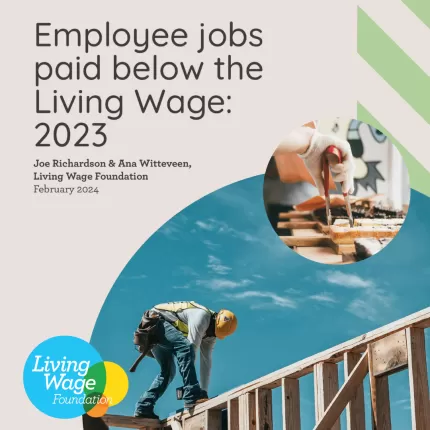London’s Low Pay Landscape
This report sets out to understand who earns less than the London Living Wage, and the impact this has on their lives. It functions as a companion piece to our previous publication, London’s Living Hours Landscape: Exploring Insecure Work in the Capital to provide a better understanding of in-work poverty in London by exploring its two main drivers: low pay and insecure work.
Of all UK regions, London has seen the least progress on eradicating low pay since 2012, with only a 3-percentage point decrease in the proportion of low paid jobs between 2012 and 2023, less than half the UK’s average reduction over the same period. Despite London having previously been amongst the regions with the lowest incidence of low pay, there is now a higher rate of low pay in London compared to the UK as a whole (13.3 per cent vs 12.9 per cent). This is worrying because the higher cost of living in the capital exposes more low paid Londoners to the risk of in-work poverty.
Our research highlights the persistent challenges faced by low paid workers in London due to ongoing cost of living pressures. Many are living pay check to pay check, cannot afford food and have fallen behind on bills. These findings underscore the necessity of a wage that reflects the higher costs of living in the capital, so that all Londoners can live with dignity.
Key findings
- 574,000 jobs in London are low paid (13.3 per cent of jobs).
- There are significant variations in the rate of low pay across Londoners. Those most impacted are people who work in Outer Boroughs, Hospitality workers, women, part-time workers, workers aged 18-21, renters, minority ethnic workers, and workers born outside of the UK.
- Over a third (36 per cent) of low paid workers in London have regularly skipped meals for financial reasons, with 42 per cent having difficulty paying for food and half (51 per cent) having used a foodbank in the past year.
- Many low paid Londoners have little or no financial safety net, with 41 per cent having less than £10 left over each week, once they have paid for essentials like housing, food, utilities and transport.
- The negative impacts of being low paid in London extend across many areas of workers’ lives. A large majority reported that their level of pay has a negative impact on their anxiety levels (69 per cent), their overall quality of life (68 per cent), their sleep quality (66 per cent) and their mental health (65 per cent). A majority also reported negative impacts on their relationships with close friends and family and with their partner.
- Our polling found that low paid Londoners identified increased pay as the most important measure their employer could offer them.


